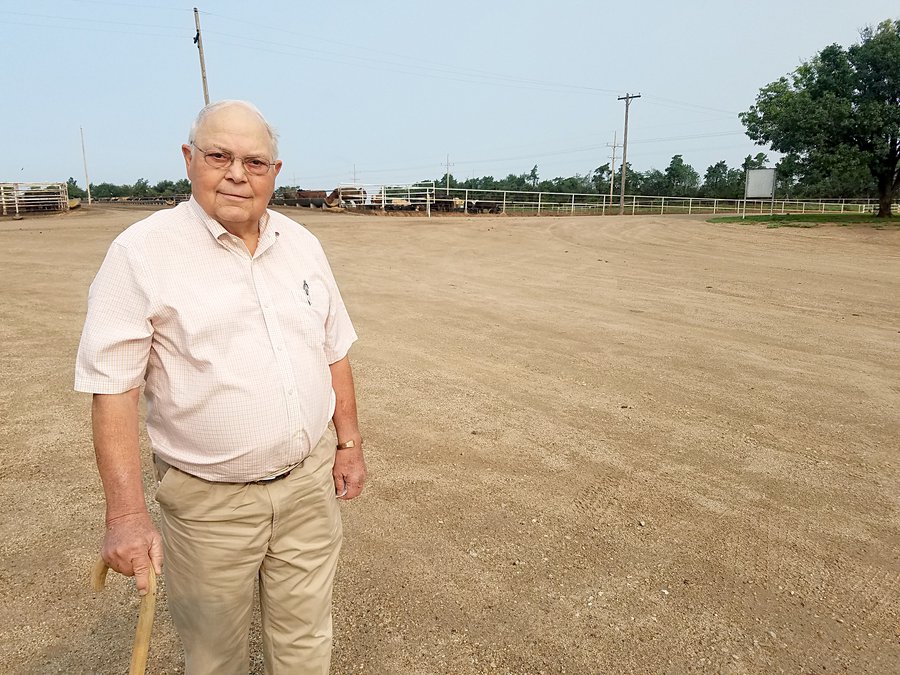LYONS – Kenny Knight’s uncertain journey into the scary realm of cancer started five years ago.
Today, as the 80-year-old veteran Lyons cattleman looks out over Knight Feedlot north of this Rice County community, he revels in the fact he emerged from that murky world cancer free.
But, the real story is how Knight made that trek from a deadly diagnosis to being a survivor. It is a saga of taking sickening traditional treatments and stepping into the unknowns of an herbal-based supplement produced by Sterling chemist Gene Zaid.
“I was given six months to live,” said Knight, relaxing in his office filled with mementoes marking his years in business. “Now the cancer is gone.”
Knight attributes his survival in large part to Zaid and his creation Afaya, a mixture of black calla lily (arum Palaestinum) and other extracts.
Through this ordeal, the two have formed an inextricable bond.
“We are delighted and happy for Kenny,” Zaid said.
Kenny Knight’s journey
“Five years ago, I was diagnosed with prostate cancer,” Knight said. “By the time they removed the prostate, the cancer had spread to my shoulder blades, ribs and spine.”
Things looked dim. He launched on the traditional regimen of chemo and radiation therapy.
“That’s when Gene entered the picture,” he said. Knight and Zaid had known each for several years, dating back to when Zaid helped found Jacam Catalyst, the long-time Sterling oilfield chemical company.
At this point, Zaid was still in the developmental stage and was only producing his supplement in the form of a tea. He now makes Afaya in tablets.
“I must have drank 21 gallons of that stuff,” Knight said. He sipped it religiously, even though it tasted “awful.”
The cancer cleared, much to the amazement of his doctors at the Mayo Clinic in Rochester, Minn. He didn’t tell his doctors about his alternative treatment.
Knight breathed a sigh of relief, until a year ago when he learned he had bladder cancer.
“I went through most of the chemo and radiation,” he said. “I also kicked up the Afaya dietary supplement. Suddenly the cancer went away.”
Again, he kept the use of Zaid’s product to himself. “I continued with the medication the doctors told me to do,” Knight said.
But, these medicines were making him extremely sick. Much to the doctors’ dismay, he stopped them, but kept taking the tablets.
He said he can’t prove the Afaya, this time as pills, cured him, but he suspects it was a big factor. “They were astonished it went away that fast.”
Gene Zaid’s journey
A native of Palestine, Zaid said the black calla lily is wild and native to that region. “It has traditionally been used for thousands of years to treat a variety of things.”
It took him some time, but he garnered permission from the United States Department of Agriculture and the Department of Homeland Security to import the lily to America. He has been working on developing Afaya for over 13 years.
The plant thrives during the winter months, but the winter months in the Middle East are much warmer than in Central Kansas. He wanted to grow in Rice County where winters can get bitter cold.
The construction of a green house was the answer.
Next, he overcame the bitter taste of the plant in liquid form by compressing it into pills. Both the tea and powder form are now patented.
“It supports prostate health and it supports glucose health,” Zaid said. Although stopping short of making any other claims, he said Afaya has undergone the stringent Food and Drug Administration testing and was deemed safe.
To improve up the natural properties of the lily, Zaid said he has “beefed it up” with other plants.
It has been a long road for Zaid. It has also been a costly one.
Starting in his spare time in 2005, the chemist fiddled and tweaked with his formula. Then, left Jacam and dedicated himself to the venture full-time.
“I devoted all the money from the sale of Jacam to testing and working on this,” he said. He had been giving the supplement away, and just started selling it in May through his business Hyatt Life Sciences based in Sterling.
His creation is now undergoing testing by Sufi Thomas, a scientist at the University of Kansas. Soon, it is hoped papers will be published documenting that Afaya may also help with head and neck issues.
Afaya is Arabic and translates as health.
I was given six months to live. Now the cancer is gone.Kenny Knight, Lyons cancer survivor





